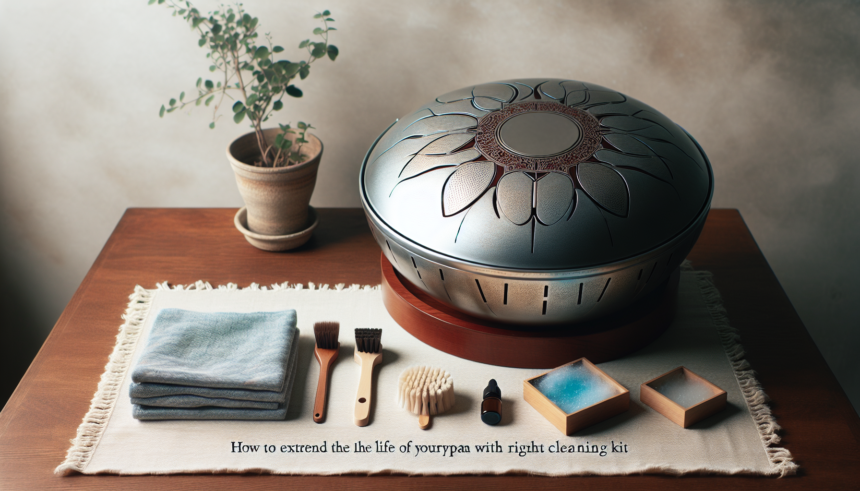<!DOCTYPE html>
<html lang="en">
<head>
<meta charset="UTF-8">
<meta name="viewport" content="width=device-width, initial-scale=1.0">
</head>
<body>
<p>The handpan, a unique and enchanting instrument, has captivated musicians around the world with its ethereal sounds and distinctive design. Like any investment, maintaining the quality and longevity of your handpan is crucial. Regular cleaning and maintenance not only preserve the instrument's appearance and acoustics but also enhance its lifespan. Here’s how you can extend the life of your handpan using the right cleaning kit.</p>
<h2>Understanding Your Handpan</h2>
<p>Before diving into cleaning techniques, it’s essential to understand what a handpan is. Typically crafted from steel, it features a dome-like shape with a central note and several surrounding tone fields. The handpan relies on its precise tuning and delicate construction for its sound quality, making proper care and maintenance paramount.</p>
<p>Unlike many other musical instruments, handpans are susceptible to the elements, especially humidity and sweat from hands. These can cause the instrument to rust or sound less resonant over time, emphasizing the need for regular cleaning and maintenance.</p>
<h2>The Necessity of a Good Cleaning Kit</h2>
<p>Having a high-quality cleaning kit is imperative for preserving your handpan. The kit should include all necessary tools to clean, polish, and protect the instrument. Proper cleaning kits typically contain:</p>
<ul>
<li><strong>Microfiber cloths</strong> - These are gentle enough to avoid scratching the surface while effectively removing dust and oil.</li>
<li><strong>Non-abrasive cleaners</strong> - These can remove oils and fingerprints without damaging the surface.</li>
<li><strong>Protective oils</strong> - These oils form a barrier against rust and other environmental factors.</li>
<li><strong>Polish</strong> - Specifically designed polishes can restore the luster of the instrument and enhance its visual appeal.</li>
</ul>
<h2>Step-by-Step Cleaning Process</h2>
<h3>Step 1: Dusting Off</h3>
<p>Begin by gently dusting the surface with a clean, dry microfiber cloth. This will remove any loose particles that might scratch the instrument during cleaning.</p>
<h3>Step 2: Applying Cleaner</h3>
<p>Using a non-abrasive cleaner specifically designed for handpans, apply a small amount directly onto a clean microfiber cloth. Gently wipe the surface of the handpan in circular motions. Be cautious not to apply too much pressure, as this could disturb the tuning of the instrument.</p>
<h3>Step 3: Polishing the Surface</h3>
<p>After cleaning, use a polish designed for handpans to restore its shine. Apply the polish using a soft cloth and buff it gently in circular motions. This step is crucial for maintaining the instrument's aesthetic and providing a protective layer against environmental damage.</p>
<h3>Step 4: Oiling for Protection</h3>
<p>Finish the cleaning process by applying a layer of protective oil. The oil helps in preventing rust, especially if you live in a humid climate. Apply a small amount on a cloth and evenly distribute it over the handpan's surface. Allow it to sit for a few minutes before wiping off any excess oil.</p>
<h3>Step 5: Regular Maintenance</h3>
<p>Regular maintenance is vital for handpan longevity. Apart from cleaning, store your handpan in a dry, cool place to prevent moisture-related damage. Investing in a handpan case can also provide an additional layer of protection during transport or storage.</p>
<h2>Benefits of Regular Cleaning</h2>
<p>Regular cleaning of your handpan not only enhances its appearance but also plays a significant role in maintaining sound quality. Dirt and oils from consistent playing can affect the instrument’s resonance and sustain. By ensuring that your handpan is kept clean, you’ll help maintain its sound integrity.</p>
<p>Moreover, regular maintenance helps identify minor issues early, such as small areas of rust or slight detuning, which can be addressed before they become significant problems. It also ensures that your instrument remains enjoyable to play, with a consistent and pleasing outward appearance.</p>
<h2>Choosing the Right Cleaning Kit</h2>
<p>Not all cleaning kits are created equal, so it’s important to choose one that is specifically designed for handpans. Look for reputable brands that understand the unique needs of these instruments. Online reviews and recommendations from other handpan players can provide valuable insight into the effectiveness of different kits.</p>
<p>A quality kit should balance effectiveness in cleaning and protection without using harsh chemicals that could harm the handpan’s surface or affect its acoustics. Key considerations also include the material of the cleaning cloths and the formulation of oils and cleaners.</p>
<h2>Conclusion</h2>
<p>Taking the time to properly clean and maintain your handpan can significantly extend its lifespan. A suitable cleaning kit helps keep your instrument in top playing condition and preserves its unique sound quality. By following the outlined steps and making cleaning a regular part of your handpan routine, you’ll ensure your beloved instrument serves you well for many harmonious years.</p>
<h2>Frequently Asked Questions</h2>
<h3>1. How often should I clean my handpan?</h3>
<p>It’s best to clean your handpan after every few playing sessions or at least once a month if played less frequently. Regular cleaning helps prevent the build-up of oils and dirt that can harm the instrument over time.</p>
<h3>2. Can I use regular household cleaners on my handpan?</h3>
<p>No, regular household cleaners may contain harsh chemicals that can affect the surface and sound of your handpan. Always use cleaners specifically designed for handpans.</p>
<h3>3. What should I do if I notice rust on my handpan?</h3>
<p>If you notice rust forming, gently clean the area and apply a protective oil immediately. If the rust persists, consider consulting a professional for restoration.</p>
<h3>4. Is it necessary to apply oil to my handpan?</h3>
<p>Yes, applying oil is a crucial step in protecting your handpan from rust and environmental damage. Make sure to use a non-abrasive oil specifically designed for metal instruments.</p>
<h3>5. Can I make my own handpan cleaning kit?</h3>
<p>While it's possible to create a DIY kit with microfiber cloths and natural oils, it’s recommended to use products specifically designed for handpan care to ensure effectiveness and safety for your instrument.</p>
</body>
</html>How to Extend the Life of Your Handpan with the Right Cleaning Kit

Leave a comment




